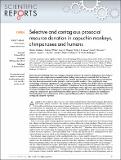Selective and contagious prosocial resource donation in capuchin monkeys, chimpanzees and humans
Abstract
Prosocial acts benefitting others are widespread amongst humans. By contrast, chimpanzees have failed to demonstrate such a disposition in several studies, leading some authors to conclude that the forms of prosociality studied evolved in humans since our common ancestry. However, similar prosocial behavior has since been documented in other primates, such as capuchin monkeys. Here, applying the same methodology to humans, chimpanzees, and capuchins, we provide evidence that all three species will display prosocial behavior, but only in certain conditions. Fundamental forms of prosociality were age-dependent in children, conditional on self-beneficial resource distributions even at age seven, and conditional on social or resource configurations in chimpanzees and capuchins. We provide the first evidence that experience of conspecific companions' prosocial behavior facilitates prosocial behavior in children and chimpanzees. Prosocial actions were manifested in all three species following rules of contingency that may reflect strategically adaptive responses.
Citation
Claidière , N , Whiten , A , Mareno , M C , Messer , E J E , Brosnan , S F , Hopper , L M , Lambeth , S P , Schapiro , S J & McGuigan , N 2015 , ' Selective and contagious prosocial resource donation in capuchin monkeys, chimpanzees and humans ' , Scientific Reports , vol. 5 , 7631 . https://doi.org/10.1038/srep07631
Publication
Scientific Reports
Status
Peer reviewed
ISSN
2045-2322Type
Journal article
Description
The project was supported by a grant from the John Templeton Foundation (Ref 20721) to AW.Collections
Items in the St Andrews Research Repository are protected by copyright, with all rights reserved, unless otherwise indicated.

